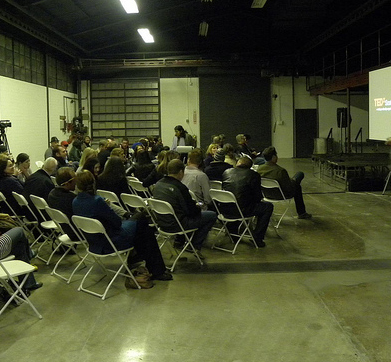
Phoenicians braved the chilly desert Wednesday night, bundled in festive hats and scarves, to meet at the Levine Machine in the Warehouse District downtown for the latest TEDx event.
The theme of the night was “Urban Placemaking and Third Places,” those spots in our communities where we rub elbows with strangers, make new connections and create memories. They are the spaces where “everyone knows your name” and equally charming because you never know whom you’ll bump into. These Third Spaces give a city character. They are necessary to community vitality because they embrace us. As one speaker put it, these spaces make life more humane through the social interactions they provide, the interactions we intuitively crave as human beings.
In his opening remarks, Bob Diehl, one of the organizers of the event (along with Andrew Knochel and Jim McPherson), stated that the Valley of the Sun is at a crossroads.
“How it got here cannot be how it moves forward, unless we want to be left in the dustbin of history. Dialogue will help the city move forward.”
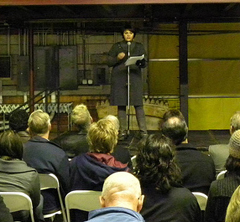
And that’s what TEDx events aim to do through rousing talks from people in the community who are on the front lines changing the landscape and culture of the city. The weather may have been chilly and dark but the Levine Machine felt warm as it was lit up by the power and optimism of bright ideas.
The first speaker of the night, Marianne Belardi gave a talk titled, “People Who Need People.” She reminisced about the Third Places of her youth and the nostalgia they created.
“Third Places offer sustenance with a side of sociability,” she said.
Places like farmers markets, coffee shops, even open mic nights create a place for community connections.
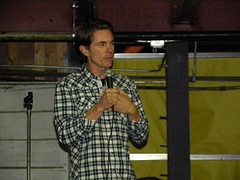
Craig DeMarco, owner of Postino, Windsor
, and Churn spoke about urban redevelopment and not taking no for an answer.
He shared a story of a trip through small towns in Italy where he frequently wound up at the local wine bars. Back in Phoenix he searched for the same spaces for a similar experience but found none, so he and his wife set out to create it. They faced challenges from neighborhood opposition and the red tape of the city, but they succeeded by never giving up the dream. Today his business ventures are recognized as some of the best local restaurants in the Valley, unique for purposefully being tied to the history of the neighborhoods where they are located. (The original Postino is housed in the old Arcadia post office building and Windsor is located in an old building tucked into the Windsor Square neighborhood.)
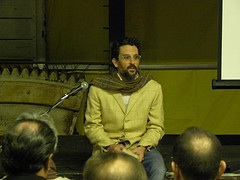
He announced to the attendees that the stretch of Central Avenue north of Camelback near Windsor will have bike lanes added by narrowing Central Avenue from 6 lanes of traffic to 4 to create a more pedestrian friendly environment for the neighborhood.
Jeff Fischer spoke next about his concept for Lux, considered one of the best coffee shops in Phoenix. The only speaker to deliver his remarks sitting down, he spoke in verse with the passion of an artist explaining the nuances of his latest masterpiece. “Lux is a personal confession,” he said.
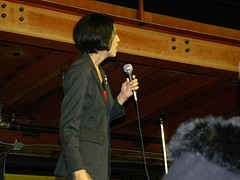
The evening concluded with speaker Margaret Bruning, the former associate director of Scottsdale Public Art. She spoke about public art as a Third Place because it “becomes a portal for others in the community to create their own experiences.”
“It’s our job to take advantage of our public spaces, private spaces, coffee shops. People crave authenticity to mingle, walk and learn something new.” Along the banks of one of the Valley’s greatest assets, the 131 miles of canals, more pedestrian pathways and public art are being developed because, “that’s the community’s living room.”
The theme for the next TEDxScottsdaleSalon is “Rethinking the Grid” and will be this Saturday from 3:30 to 7 p.m. at the Scottsdale Museum for Contemporary Art.
Photos courtesy of Jeremy Stapleton.
